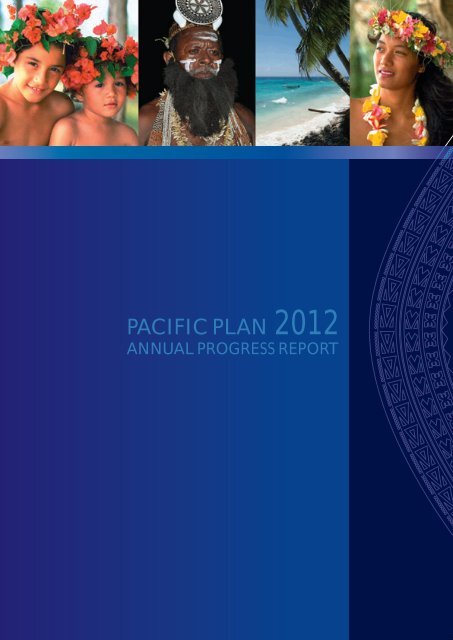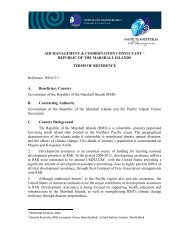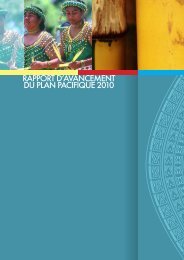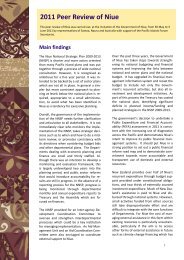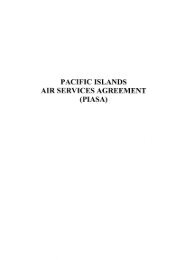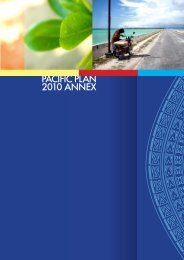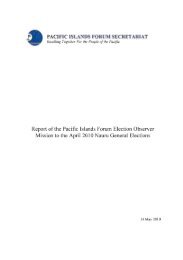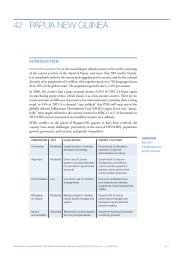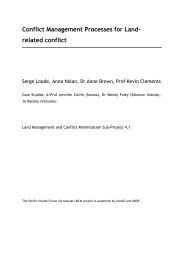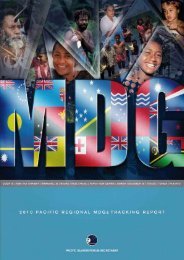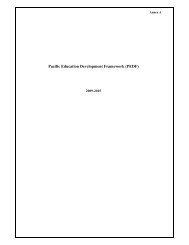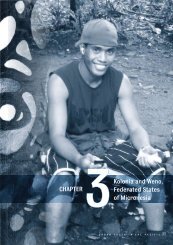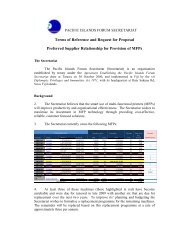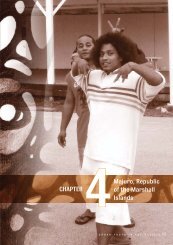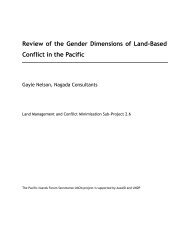PACIFIC PLAN 2012 - Pacific Islands Forum Secretariat
PACIFIC PLAN 2012 - Pacific Islands Forum Secretariat
PACIFIC PLAN 2012 - Pacific Islands Forum Secretariat
Create successful ePaper yourself
Turn your PDF publications into a flip-book with our unique Google optimized e-Paper software.
<strong>PACIFIC</strong> <strong>PLAN</strong> <strong>2012</strong><br />
ANNUAL PROGRESS REPORT
Contents<br />
Secretary General’s Introduction 2<br />
Foreword 4<br />
Progress of the <strong>Pacific</strong> Plan 4<br />
Key Achievements Over 2011 to <strong>2012</strong> 6<br />
Fostering economic development and promoting<br />
opportunities for broad-based growth<br />
Improving livelihoods and the well-being of <strong>Pacific</strong> peoples<br />
Addressing the impacts of climate change<br />
Achieving stronger national development through better governance<br />
Ensuring improved social, political and legal conditions for<br />
stability, safety, and security<br />
<strong>Pacific</strong> Plan and the Post-2015 Development Agenda 17<br />
Engaging with Non-State Actors 19<br />
<strong>Pacific</strong> Plan Staff 20<br />
Looking Ahead 20
2<br />
Secretary General’s<br />
Introduction<br />
At the recent 43rd <strong>Pacific</strong> <strong>Islands</strong> <strong>Forum</strong> held in the Cook <strong>Islands</strong>, Leaders endorsed arrangements<br />
for the review of the <strong>Pacific</strong> Plan in 2013. The review will be a milestone event in the experience<br />
of the <strong>Pacific</strong> Plan and will be an opportunity of considerable importance in determining the<br />
course of <strong>Pacific</strong> regionalism for the future. As a ‘living document’, it is essential that the <strong>Pacific</strong><br />
Plan is up-to-date and true in its reflection of the aspirations and expectations of <strong>Pacific</strong> communities<br />
and that it is able to provide effective guidance and support to the endeavours for regional<br />
cooperation and integration. Significant changes have occurred to the regional and global<br />
development agenda since the adoption of the <strong>Pacific</strong> Plan in Madang in 2005 and in all aspects<br />
these will need to be addressed when assessing the Plan in the currency of its implementation and<br />
performance and in the directions for the years ahead.<br />
The outcomes of the Rio+20 United Nations Conference on Sustainable Development will,<br />
without question, have a central place in the Plan review and assessments. <strong>Pacific</strong> countries were<br />
well represented in Rio and, on the whole, I believe key <strong>Pacific</strong> messages have been captured and<br />
reflected in the outcomes of Rio+20 and “The Future We Want” document. The ‘special case’ for<br />
Small Island Developing States (SIDS) for sustainable development and the environment has been<br />
globally acknowledged since the first Rio Conference on the Environment and Development<br />
(UNCED) in 1992. The reaffirmation at Rio+20 of the special case for SIDS, twenty years later,<br />
is of particular importance in highlighting the special exposure and vulnerabilities which continue<br />
to pose serious challenges to all SIDS communities. Similarly, the Rio+20 outcomes provide<br />
considerable prominence to issues relating to the oceans and fisheries, in the context of sustainable<br />
development and in a manner directly relevant and applicable to the <strong>Pacific</strong> countries and region.<br />
The range of global issues covered in the Rio process provide pertinent background against which<br />
to reflect on the region’s endeavour with the <strong>Pacific</strong> Plan and progress made in seeking to achieve<br />
its vision and aims, and with the practical programmes for implementing its priorities. While<br />
necessarily focused on actions at the national and regional level, the ultimate results of sustainable<br />
development efforts in the <strong>Pacific</strong> are conditioned by and involve significant engagements with<br />
the wider international community, in particular with the region’s development partners. In that<br />
sense and because it is the master regional strategy, the <strong>Pacific</strong> Plan lies at the heart of long-term<br />
sustainability for the region and for all <strong>Pacific</strong> communities. The Plan is the signal of the <strong>Pacific</strong>’s<br />
seriousness and determination to work together as a region to achieve meaningful and sustainable<br />
development outcomes for all <strong>Pacific</strong> peoples. The need for accuracy in determining development<br />
priorities provides a natural basis for regional cooperation and consensus building among member<br />
countries and, of particular importance, a rallying point for the region’s professional
and implementation services from all Council of Regional Organisations in the <strong>Pacific</strong> and, with<br />
effective coordination and alignment, from all development partners.<br />
It is inherent in the nature of the <strong>Pacific</strong> Plan that it remains true to its forward-looking dimension,<br />
and to seek always to do better. The region can, and it must. The challenges of growth and<br />
development in the 21st Century are complex and difficult, and will require determined and<br />
collective efforts to deliver effective and sustainable outcomes for the benefit of all <strong>Pacific</strong><br />
communities. Reviewing the <strong>Pacific</strong> Plan and ensuring that it remains relevant and appropriate<br />
for the region is a key part of its in-built strategy. We in the <strong>Secretariat</strong> look forward to the outcomes<br />
of the discussions and consultations which will take place across the region in the coming months<br />
of the <strong>Pacific</strong> Plan review and what we expect to be productive responses from Member countries<br />
and their communities on their expectations of the Plan and its workings as an effective instrument<br />
for <strong>Pacific</strong> regionalism and for the future of regional cooperation and integration.<br />
Tuiloma Neroni Slade<br />
Secretary General<br />
3
4<br />
Foreword<br />
This report provides an update on implementation of the <strong>Pacific</strong> Plan priorities over the period<br />
May 2011 to May <strong>2012</strong>. It is based on progress reports from selected Members of the <strong>Pacific</strong><br />
<strong>Islands</strong> <strong>Forum</strong> and Council of Regional Organisations in the <strong>Pacific</strong> (CROP) agencies. It also<br />
discusses the role of the <strong>Pacific</strong> Plan in the global processes of the post-2015 global development<br />
agenda and the Sustainable Development Goals.<br />
Detailed reporting on the <strong>Pacific</strong> Plan priorities is available in the companion annex to this Annual<br />
Progress Report.<br />
Progress of the <strong>Pacific</strong> Plan<br />
The <strong>Pacific</strong> Plan, which was endorsed by Leaders in Madang in 2005, is the master strategy for<br />
strengthening regional cooperation and integration. The Plan was reviewed and updated with a<br />
set of guiding priorities in 2009, to assist in its implementation and ensure its ongoing relevance.<br />
As a living document, the Plan has continued to provide a framework for aligning and coordinating<br />
the work of CROP agencies.<br />
This Annual Progress Report is structured around the five priority themes endorsed by the Leaders<br />
in 2009: (a) fostering economic development and promoting opportunities for broad-based growth;<br />
(b) improving livelihoods and the well-being of <strong>Pacific</strong> peoples; (c) addressing the impacts of<br />
climate change; (d) achieving stronger national development through better governance; (e)<br />
ensuring improved social, political, and legal conditions for stability, safety, and security.<br />
This report summarises progress against these themes over the last year and highlights issues<br />
regarding the strategic directions of the <strong>Pacific</strong> Plan, including the proposed review in 2013,<br />
applications of the post-2015 global development agenda and Sustainable Development Goals,<br />
and engagement with non-state actors.<br />
The past 12 months have seen a number of achievements across a range of sectors in support of<br />
the objectives of the <strong>Pacific</strong> Plan. These have included:<br />
a. <strong>Pacific</strong> <strong>Islands</strong> <strong>Forum</strong> Leaders issuing the Waiheke Declaration on Sustainable Economic<br />
Development at their annual meeting, held in Auckland in September 2011. Leaders<br />
emphasised the importance of fisheries, tourism, and agriculture as productive sectors with<br />
the greatest potential in the <strong>Pacific</strong>, as well as the importance of transport, infrastructure,<br />
education, and energy sectors to enable growth.<br />
b. Executives of CROP agencies strengthened the technical capacity of the Sub-Committee<br />
on Climate Change by establishing an officials’ Working Arm on Climate Change. This<br />
will improve coordination of climate change efforts amongst agencies. A major study on<br />
options for climate change financing was completed and presented to Leaders and <strong>Forum</strong><br />
Economic Ministers in July 2011.<br />
c. Securing funding to implement the <strong>Pacific</strong> Oceanscape Framework, which envisages action<br />
at both the national and regional levels to protect and manage the region’s oceans. The<br />
<strong>Pacific</strong> also successfully advocated for global recognition of the importance of oceans as a<br />
key outcome of Rio+20 Conference.
d. Implementation of the <strong>Pacific</strong> Education Development Framework to improve the quality<br />
and relevance of education across the region.<br />
e. Implementation of the <strong>Forum</strong> Compact on Strengthening Development Coordination in<br />
the <strong>Pacific</strong>, including peer reviewing the Republic of the Marshall <strong>Islands</strong> in early-<strong>2012</strong> and<br />
holding follow-up visits to Nauru and Kiribati. Peer reviews were recognised internationally<br />
at the Fourth High Level <strong>Forum</strong> on Aid Effectiveness held in Busan in November 2011 as<br />
an innovative approach to improving country-level policy and systems.<br />
While there have been notable achievements under the <strong>Pacific</strong> Plan over the last 12 months,<br />
significant challenges still face the region. Achieving sustainable economic growth as outlined in<br />
the Waiheke Declaration will be difficult for all <strong>Pacific</strong> island countries given the current global<br />
downturn. This places significant strain on the financial and fiscal capacity of governments in the<br />
region to deliver effective and affordable services to their people. They must also make tough<br />
decisions on allocation of very limited resources to address major economic and social trends -<br />
including an alarming rise in non-communicable disease and its impact on productive labour; and<br />
the growing number of young people who remain unemployed and without the skills to participate<br />
in the productive sector. In the medium to longer-term, this situation could be exacerbated by<br />
declining aid flows if the economic crisis in Europe significantly affects Asian markets.<br />
The renewed focus on sustainable development also highlights the region’s heavy dependence on<br />
petroleum and exposure to oil price fluctuations. This makes transport and electricity provision<br />
more expensive, and also has flow-on effects for other sectors that rely on electricity for effective<br />
service provision, including Information and Communications Technology (ICT), water supply<br />
and wastewater, and education and health services. Attempts to address this dependence, for<br />
example through the bulk purchase of petroleum, have demonstrated the technical difficulties<br />
faced by the <strong>Pacific</strong>. Addressing difficulties such as the different grades of petrol in use across the<br />
region, the range of storage facilities, and multiple contracting arrangements will require a longterm<br />
approach.<br />
<strong>Pacific</strong> island countries are also bearing the brunt of the impact of climate change. The tidal surges<br />
that are engulfing atoll nations such as Kiribati and Tuvalu are having an immediate impact on<br />
their livelihoods. The drought that hit Tuvalu in September-October 2011 clearly demonstrated<br />
that even small variations in annual rain-fall patterns can have a devastating impact on vulnerable<br />
<strong>Pacific</strong> island countries. Climate change will continue to impact on all aspects of <strong>Pacific</strong> life - the<br />
health of the oceans and the availability of fish in the sea, changing patterns of agricultural<br />
production and access to water, and increasing sea levels. The region will continue to raise its<br />
collective voice with the international community to ensure that its views are heard. But it will<br />
also need the support and funding of the international community to find ways to adapt to the<br />
impacts of climate change.<br />
The wide-spread nature of the challenges facing the <strong>Pacific</strong> region reinforces the importance of<br />
integration and cooperation. The <strong>Pacific</strong> Plan remains a strategic driver of the aspirations of the<br />
nations of the <strong>Pacific</strong> to work closer together for the benefit of their people. It continues to help<br />
shape a regional voice at the international level on a range of issues, including climate change and<br />
sustainable development; and to define the priorities of <strong>Forum</strong> island countries in their partnership<br />
with CROP agencies and development partners. The proposed review of the <strong>Pacific</strong> Plan in 2013<br />
will be a key opportunity to ensure that the Plan remains relevant to the people that it serves.<br />
5
6<br />
Key Achievements Over 2011 to <strong>2012</strong><br />
Fostering economic development and promoting opportunities<br />
for broad-based growth<br />
As in past years, sustaining economic growth across the region continued to be a high priority<br />
under the <strong>Pacific</strong> Plan in 2011-12. This priority was emphasised and elaborated through the<br />
Waiheke Declaration made by <strong>Forum</strong> Leaders in Auckland in September 2011. In the period since<br />
the issuing of the Declaration, notable progress has been made in implementing projects in key<br />
focal areas for economic development, including those relating to energy security, transport safety,<br />
tourism, trade, and fisheries. The recent <strong>Forum</strong> Economic Ministers Meeting (FEMM) in Kiribati<br />
in July <strong>2012</strong> affirmed the Waiheke Declaration’s ongoing importance as a guiding document for<br />
implementing economic growth priorities under the <strong>Pacific</strong> Plan. The Ministers proposed a special<br />
Working Group on the Waiheke Declaration, comprising technical agencies be established at the<br />
regional level to progress discussion, coordination, policy advocacy, and implementation of relevant<br />
actions; and to report back to the annual FEMM.<br />
In the area of energy security, a notable achievement has been the <strong>Secretariat</strong> of the <strong>Pacific</strong><br />
Community’s (SPC) completion of baseline energy security indicators for all the <strong>Forum</strong> island<br />
countries, with country energy profiles to be published in the second half of <strong>2012</strong>. The continued<br />
assessment of these profiles, using the agreed indicators, is important for tracking energy security<br />
initiatives. Some progress has also been made with renewable energy development. At present,<br />
only Fiji, Samoa, and Vanuatu have significant shares of renewable energy in the total electricity<br />
supply (60%, 37%, and 15%, respectively). In the coming years, the share of renewables in other<br />
countries is expected to increase modestly as a result of substantial project investments currently<br />
underway, such as: the Northern <strong>Pacific</strong> Renewable Energy and Efficiency Project, the <strong>Pacific</strong><br />
Environment Community Fund, and the <strong>Pacific</strong> <strong>Islands</strong> Greenhouse Gas Abatement through<br />
Renewable Energy Project. Although the overall share of renewables will likely remain small for<br />
some time, work by CROP agencies continues to build a foundation for medium and long-term<br />
renewable energy development.<br />
More effective reductions in fossil fuel use may be achieved through efficiency gains, which CROP<br />
agencies are working to support. To help develop well-targeted plans for improving efficiency in<br />
utilities, the International Renewable Energy Agency, working with the <strong>Pacific</strong> Power Association<br />
(PPA), has initiated a grid stability assessment for the <strong>Pacific</strong> island grids to determine how much<br />
renewable energy generation they can absorb. In addition, PPA has conducted performance<br />
benchmarking and energy efficiency studies to help track performance across its Member utilities.<br />
As areas for efficiency improvement are identified, significant investment at the national level will<br />
be required. Meanwhile, to help improve efficiency at the user-level, Fast Start Finance of AU$3<br />
million has been secured through Australia’s Department of Climate Change and Energy Efficiency<br />
for a three year <strong>Pacific</strong> Appliance Labelling and Standards project. It is expected that this initiative<br />
will help consumers and businesses to identify more efficient appliances, enabling them to decrease<br />
their energy expenditure.<br />
CROP agencies have also been working to better understand and address a bigger energy-related<br />
economic constraint: the heavy reliance on petroleum products in the transport sector. Across the<br />
region, approximately 1.3 billion litres of fossil fuels are imported annually at a total cost of US$873<br />
million. Of this total, 16 percent is used in electricity generation; much more is used for transport.<br />
Recognising the importance of petroleum use beyond the electricity sector, the SPC recently held<br />
a regional workshop on petroleum pricing, noting the need for legislation to regulate supply
security to control price, standards, safety, and quality; and the regional benefits of harmonisation<br />
and transparency in petroleum pricing arrangements and practices. SPC is also working with key<br />
international and regional stakeholders to encourage the development and use of viable alternative<br />
means of propulsion for shipping in a post-carbon economy.<br />
In other areas of the transport sector, CROP agencies have focused on helping to improve the<br />
safety, reliability, and accessibility of the maritime and aviation services that are essential for regional<br />
trade, travel, and tourism. SPC has continued work to ensure that countries around the region<br />
comply with international and regional maritime conventions, and has provided particular support<br />
to Member countries that have sadly experienced recent ferry disasters. Search and rescue workshops<br />
have been hosted, in collaboration with the Australian Maritime Safety Authority, International<br />
Maritime Organization, Maritime New Zealand, and the United States Coast Guard; and a<br />
Memorandum has been signed to help address the risk of a mass rescue situation - of particular<br />
importance in light of the growing number of cruise ships visits to the region, which contribute<br />
to tourism growth.<br />
In aviation, the <strong>Pacific</strong> Aviation Safety Office has been recognised for its success in ensuring regional<br />
compliance with international safety standards, and is receiving World Bank support to expand<br />
and refocus its efforts through the <strong>Pacific</strong> Aviation Investment Project for regulatory oversight<br />
activities. SPC and the Association of South <strong>Pacific</strong> Airlines, collaborating under a Memorandum<br />
of Understanding signed in May <strong>2012</strong>, are considering the concept of a regional airline. One option<br />
is to call for competitive tenders, either individually or collectively, for the provision of air services<br />
on selected intra-regional routes. This would be much simpler and less expensive than previous<br />
regional proposals, and would bring in similar benefits to the airlines and or governments that do<br />
not wish to own their aircrafts. It could also help with the promotion of tourism in areas where<br />
limited airline schedules are currently a constraint.<br />
7
8<br />
Tourism remained a key driver of economic growth in the <strong>Pacific</strong> region and was recognised by<br />
Leaders’ last year in the Waiheke Declaration as one of the key productive sectors. It is the main<br />
stay for income generation in a number of <strong>Forum</strong> island countries, with some estimates suggesting<br />
that total revenue from tourism flows to the region will account for some US$2 billion from 2010<br />
onwards. The South <strong>Pacific</strong> Tourism Organisation (SPTO) led efforts to improve access to the<br />
region, including through training and awareness raising workshops for travel agents in Europe<br />
and China through its ‘South <strong>Pacific</strong> Specialists Programme’. A joint online campaign with <strong>Pacific</strong><br />
Trade & Invest and Lonely Planet featured 16 <strong>Pacific</strong> island destinations and their unique<br />
characteristics. SPTO also developed niche profiles for <strong>Pacific</strong> island countries, covering diverse<br />
activities such as fishing, diving, surfing, weddings, and festivals. Over 400 students graduated<br />
from the Australia-<strong>Pacific</strong> Technical College in tourism and hospitality, supporting professional<br />
staff development in the sector. Increasing cruise line operations was also a focus, with the New<br />
Zealand Government and the Asian Development Bank (ADB) implementing a five-year programme<br />
to improve domestic shipping facilities and safety in Vanuatu. SPTO participated in the <strong>2012</strong><br />
Seatrade Cruise Convention in Miami to strengthen industry networks with key cruise line<br />
operators; and prepared a cruise shipping market intelligence report to inform members of emerging<br />
opportunities. The SPTO also commenced implementation of the <strong>Pacific</strong> Regional Tourism<br />
Capacity Building Programme (PRTCBP) <strong>2012</strong>-2014, funded under the 10th European<br />
Development Fund (EDF) to enhance the growth and sustainable development of the region’s<br />
tourism sector.<br />
The past year has seen significant work undertaken on trade issues. At their <strong>2012</strong> meeting, <strong>Forum</strong><br />
Trade Ministers expressed support for New Caledonia’s efforts to accede to <strong>Pacific</strong> Island Countries<br />
Trade Agreement (PICTA)- the regional free trade agreement that has been signed by all but two<br />
<strong>Forum</strong> island countries. The PICTA currently covers trade in goods only, but negotiations on<br />
trade in services are close to concluding with a target set for late <strong>2012</strong>. This is expected to<br />
significantly expand trading opportunities over the coming years. However, proposed Temporary<br />
Movement of Natural Persons clauses of trade enabling labour-related migration remain contentious,<br />
and in August 2011 <strong>Forum</strong> island countries agreed to defer negotiations on this area until after<br />
other services arrangements had been finalised. Issues related to labour mobility will also continue<br />
to be discussed as part of ongoing negotiations on PACER-Plus, along with five other priority<br />
areas: rules of origin, customs procedures, sanitary and phytosanitary measures, technical regulations,<br />
standards and conformity assessment procedures, and development assistance.<br />
Over 2011-12 there has also been a strong focus on preparations for the next joint negotiating<br />
session on an Economic Partnership Agreement (EPA) with the European Commission. Eight<br />
<strong>Pacific</strong> states of the African, Caribbean and <strong>Pacific</strong> (ACP) grouping have submitted draft market<br />
access offers to the European Commission, and four more are close to submission. Although there<br />
have been no formal negotiating sessions with the European Commission since 2009, <strong>Pacific</strong><br />
officials have managed to secure informal meetings to help continue discussions, and further<br />
progress is expected in late <strong>2012</strong>. A key focus for the <strong>Pacific</strong> will be on securing favourable rules<br />
of origin for fresh, chilled, and frozen fish, to help support fisheries sector development in the<br />
region.<br />
At their meeting in Auckland in 2011, Leaders’ highlighted the importance of fisheries to the<br />
long-term sustainable development of the region. Through the Waiheke Declaration, Leaders<br />
acknowledged the importance to the region of maximising the economic benefits from fisheries<br />
to support sustainable economic development. They also recognised the valuable contribution of<br />
coastal fisheries and aquaculture to food security and economic development. In support of these<br />
directions, and reflecting the importance of tuna, the <strong>Forum</strong> Fisheries Agency (FFA) and the SPC<br />
jointly supported Members to actively contribute to the formulation of conservation and<br />
management measures at the Western and Central <strong>Pacific</strong> Fisheries Commission (WCPFC)
meeting held in March <strong>2012</strong>. This included hosting workshops to review WCPFC bigeye and<br />
yellowfin tuna measures and supporting national capacity to prepare and report their annual tuna<br />
catch. SPC implemented the <strong>Pacific</strong> Tuna Tagging Programme, with tagging cruises completed<br />
in Papua New Guinea, Kiribati, and adjacent waters. At the end of May <strong>2012</strong>, 357,000 tuna had<br />
been tagged and 51,850 tags had been recovered. Data from this programme was used in the 2011<br />
stock assessments. The Papua New Guinea tagging project is currently the main component of<br />
this ongoing programme.<br />
FFA and SPC also work together to provide assistance to a number of sub-regional fisheries<br />
groupings, including the Parties to Nauru Agreement, the Te Vaka Moana Arrangement, and the<br />
Melanesian Spearhead Group Fisheries Technical Committee. Several achievements have resulted<br />
from such collaborative efforts, including a recent amendment to the implementation of the Nauru<br />
Agreement to extend fishing prohibitions to high seas areas and to prohibit setting on whale sharks,<br />
the vessel day scheme for the purse seine fishery, and a similar scheme proposed for the tropical<br />
longline fishery. In 2011-12, Parties to the Nauru Agreement applied a minimum benchmark price<br />
for fishing access of US$5,000 per day, which is about double what members had previously<br />
obtained from foreign fishing vessels. This demonstrated the benefits of maintaining effective<br />
collective resolve.<br />
FFA and SPC also guided <strong>Pacific</strong> Island Parties to the Multilateral Treaty on Fisheries with the<br />
United States of America. Following the revocation of Papua New Guinea’s instrument of withdrawal<br />
from the Multilateral Treaty, in February 2011 the United States significantly increased its funding<br />
in the <strong>2012</strong>-13 agreement year from US$21 million to US$45 million. In June <strong>2012</strong>, the United<br />
States and the <strong>Pacific</strong> Island Parties reached agreement in principle on a fishing fee payment of<br />
US$63 million for 8,300 fishing days, about the current level of fishing effort. Negotiations with<br />
the United States are continuing towards an extended Treaty satisfying the interests of all parties,<br />
which would commence in July 2013.<br />
9
10<br />
Work continued to support investment and market development related to fisheries. FFA<br />
implemented the Regional Economic Integration in Fisheries project and led collaborative<br />
arrangements to establish national tuna industries and accelerate tangible fisheries-related<br />
development projects with the Governments of Tonga, Vanuatu, Niue, Nauru, Kiribati, Tuvalu,<br />
Solomon <strong>Islands</strong>, Samoa and the Federated States of Micronesia. The FFA is also working with<br />
several members to improve their capacity to export seafood, including European Union (EU)<br />
market access requirements for food safety, competent authority certification, and EU illegal,<br />
unreported and unregulated fishing certification.<br />
In 2011-12, SPC completed a major study on the opportunities for mariculture (seawater aquaculture)<br />
in the region, as well as two national aquaculture development plans. Risk assessments for the<br />
aquaculture of new species have been completed for three projects, and a range of technical support<br />
provided. Currently a number of private sector partners are being selected to receive direct assistance<br />
to promote aquaculture for export and import substitution.<br />
Improving livelihoods and the well-being of <strong>Pacific</strong> peoples<br />
Education remained a key focus for improving the livelihoods and well-being of <strong>Pacific</strong> peoples,<br />
with progress made in implementing the <strong>Pacific</strong> Education Development Framework (PEDF).<br />
The PEDF identifies key priorities in sub-sectors of education and training and in a number of<br />
cross-cutting themes, and it brings together priorities identified in international commitments<br />
(such as the Millennium Development Goals and the Education for All goals) and in national<br />
education sector strategic frameworks. The PEDF also addresses the special needs of Small Island<br />
States, which have been prioritised in the <strong>Pacific</strong> Plan. Under the PEDF, CROP agencies are<br />
involved in implementing a wide range of education-related initiatives. Notable amongst these have<br />
been collaborative efforts between the University of the South <strong>Pacific</strong> (USP) and SPC to roll out<br />
a regional Technical and Vocational Education and Training Framework for the <strong>Pacific</strong>, and develop<br />
a draft ICT in Education Regional Framework. Both Frameworks are important for guiding<br />
ongoing investment in training to facilitate job-readiness and modernise education content and<br />
delivery. In addition, the SPC has coordinated the Regional Qualifications Framework, aimed at<br />
increasing regional harmonisation in the measurement of educational attainment to better enable<br />
people to measure their educational progress using up-to-date standards and have their qualifications<br />
recognised internationally.<br />
Young people around the region are being supported through a recently initiated Framework for<br />
Youth Development in the <strong>Pacific</strong>, which SPC has been developing in response to Leaders’<br />
commitment to support youth and, in particular, address youth employment. This work is being<br />
undertaken in close collaboration with the United Nations Development Programme (UNDP)<br />
<strong>Pacific</strong> Centre, United Nations Children’s Fund (UNICEF), International Labour Organization<br />
(ILO), United Nations Population Fund (UNFPA), the <strong>Pacific</strong> Youth Council, the Commonwealth<br />
Youth Programme, the <strong>Pacific</strong> Leadership Programme and the Oceania Football Confederation.<br />
Funded by the Government of Australia, the Framework is intended to inform national efforts to<br />
address current and future challenges in youth development, while providing guidance and direction<br />
on regional cooperation efforts to advance youth development in the context of social and economic<br />
development in the <strong>Pacific</strong> region. Over the coming year, the first phase of the Framework will be<br />
rolled out and it will be presented to <strong>Pacific</strong> Youth Ministers at the Commonwealth Youth Ministers<br />
Meeting in Port Moresby in November <strong>2012</strong>.
Complementing work on the Framework, a <strong>Pacific</strong> Youth Employment Strategy (<strong>Pacific</strong> YES) is<br />
being developed by ILO in collaboration with SPC, the <strong>Pacific</strong> <strong>Islands</strong> <strong>Forum</strong> <strong>Secretariat</strong>, and the<br />
broader <strong>Pacific</strong> Youth Framework Steering Committee. Over the coming months, the ILO will<br />
undertake further consultations with <strong>Pacific</strong> island governments, youth and other stakeholders to<br />
progress the strategy.<br />
The importance of gender equality to sustainable development in the region was also recognised<br />
by Leaders’ at their meeting in Auckland in 2011. Leaders agreed to intensify efforts to promote<br />
women’s equal role in decision-making at all levels, and to continue to improve advocacy for<br />
women’s leadership. This high level leadership is critical to addressing the significant and complex<br />
issues around gender equality in the <strong>Pacific</strong>. The 2011 <strong>Pacific</strong> Regional Millennium Development<br />
Goals (MDGs Tracking Report) highlighted mixed success on achieving MDG 3 to promote<br />
gender equality and empower women - four countries remained off track, with the performance<br />
of Tonga and Vanuatu having deteriorated over the survey period. Only the Cook <strong>Islands</strong>, Niue,<br />
and Palau were on track to achieve their goals, with Cook <strong>Islands</strong> and Palau both improving their<br />
performance. Progress in empowering women, as measured by the share of women in the nonagricultural<br />
sector and seats held by women in national parliaments, has been slow across the<br />
region. In contrast, gains are being made on achieving gender parity in education and in Fiji there<br />
are today more women in higher education than men.<br />
In July 2011, the SPC convened the Fourth <strong>Pacific</strong> Women’s Ministerial Meeting in Nadi, Fiji.<br />
Ministers recognised the need for on-going capacity building and awareness of gender equality at<br />
all levels of government, including parliament. They also noted the important role of the private<br />
sector in advancing the role of women in the economy. Importantly, Ministers noted that ratification<br />
and endorsement of a number of gender commitments at the international, regional and national<br />
levels had not led to the integration of these commitments in national and regional planning<br />
processes and urged renewed efforts by governments and development partners to address this.<br />
11
12<br />
Practical support was provided by the <strong>Forum</strong> <strong>Secretariat</strong> and UNDP, funded by the Government<br />
of Australia, to improve women’s participation in political life by running a series of workshops<br />
in Kiribati, the Republic of the Marshall <strong>Islands</strong> and Palau. These workshops aimed to improve<br />
women’s understanding of parliamentary processes and how they can engage. A number of <strong>Forum</strong><br />
island countries have also considered temporary special measures to reserve seats for women in<br />
parliament, with bills being tabled in the Federated States of Micronesia in 2009 and in Papua<br />
New Guinea in 2011. In late 2011, the Prime Minister of Samoa, the Hon. Tuila’epa Lupesoliai<br />
Sailele Malielegaoi, announced that Samoa would be developing legislation to introduce a ten<br />
percent quota for women in the national parliament.<br />
Substantial work has been undertaken over the past 12 months to implement the <strong>Pacific</strong> Regional<br />
Strategy on Disability. This has included the development of national policies in four <strong>Forum</strong><br />
island countries, with the remainder planned to be supported over the next three years. Training<br />
has been provided on the Convention on the Rights of Persons with Disabilities (CRPD) in Papua<br />
New Guinea and Samoa, in preparation of their signing and ratifying the convention. The Strategy<br />
describes a comprehensive program of work to support long-term processes of change in disability<br />
inclusive development in Member countries, and also includes provision for a monitoring and<br />
evaluation framework to support tracking of key activities. A key outcome of the strategy has been<br />
to strengthen regional partnerships to address the rights of people living with disabilities, including<br />
between the <strong>Forum</strong> <strong>Secretariat</strong> and United Nations Economic and Social Commission for Asia<br />
and the <strong>Pacific</strong> (UNESCAP), the <strong>Pacific</strong> Disability <strong>Forum</strong>, World Health Organisation, Motivation<br />
Australia, the Nossal Institute, UNICEF, United Nations Educational, Scientific and Cultural<br />
Organization (UNESCO), SPC, USP, Christian Blind Mission Australia, and the Australian<br />
Government.<br />
Support was provided in the area of human rights over 2011-12. The Universal Periodic Review<br />
is a cooperative process to review the human rights records of every UN Member state. The second<br />
round of reporting under the same process began in May <strong>2012</strong>. The <strong>Forum</strong> <strong>Secretariat</strong>, in close<br />
collaboration with the Office of the United Nations High Commissioner for Human Rights<br />
(OHCHR) and SPC’s Regional Rights Resource Team (RRRT), completed the first Universal<br />
Periodic Review training in Tonga in February <strong>2012</strong>. This training assisted the Government of<br />
Tonga to understand the new modalities and approach for the second round of reporting.<br />
Addressing the impacts of climate change<br />
Climate Change continues to be a major focus for the region, with all CROP agencies involved,<br />
to some extent, in climate change programmes and initiatives. In line with the CROP joint statement<br />
on “Collaborating to Support Effective Response to Climate Change”, each agency has focused<br />
on different work areas, with coordination through the CROP Executives Sub-Committee on<br />
Climate Change and the Working Arm on Climate Change. The <strong>Secretariat</strong> of the <strong>Pacific</strong> Regional<br />
Environment Programme (SPREP) has taken a lead role, particularly in the area of climate change<br />
negotiations, where it has provided technical support to <strong>Pacific</strong> island countries in developing their<br />
formal commitments for greenhouse gas reduction. The region has taken a strong position on<br />
actively tackling all climate pollutants and applying stringent climate warming targets. Renewable<br />
energy projects will partially assist in meeting these mitigation commitments, with a primary focus<br />
on reducing reliance on fossil fuels at both the household use and national generation levels which<br />
will have both environmental and economic benefits. However, given the difficulty of mitigation
and the inevitability of some degree of climate change, considerable effort is going into developing<br />
policies and planning processes that support climate change adaptation, as well as implementing<br />
adaptation projects on the ground.<br />
One of the major projects in this area - the US$13 million <strong>Pacific</strong> Adaptation to Climate Change<br />
programme - was recognised by the 2011 <strong>Pacific</strong> Climate Change Roundtable as providing a<br />
framework for future adaptation work and development cooperation in the region. Particular<br />
successes have come through its ability to influence policy (for instance, through the project’s<br />
support, four countries have approved Joint National Action Plans on Climate Change and Disaster<br />
Risk Management over the past year), its cross-sectoral approach (including projects to improve<br />
roads and water security), and the way it has fostered close collaboration between development<br />
partners and CROP agencies (leading to additional contributions of AU$7.3 million from the<br />
Australian Government and US$2 million from the United States Agency for International<br />
Development over the past year). Further national-level climate change adaptation is being supported<br />
through projects such as the Government of Australia’s International Climate Change Adaptation<br />
Initiative (incorporating the <strong>Pacific</strong> Climate Change Science Programme, the <strong>Pacific</strong> Adaptation<br />
Strategy Assistance Programme, and the <strong>2012</strong> <strong>Pacific</strong>-Australia Climate Change Science and<br />
Adaptation Program), the Coping with Climate Change in the <strong>Pacific</strong> Island Region project<br />
supported by the Government of Germany, and other Australian Government supported programmes<br />
run by SPC, SPREP and the USP.<br />
Despite the numerous achievements of these and other major projects, responding to climate<br />
change is still a significant challenge for most <strong>Pacific</strong> island countries. In the area of adaptation,<br />
key difficulties lie in extending initiatives to the level of sustained, “whole of country” approaches,<br />
and in coordinating the work of different agencies. Promisingly, some of the necessary expansion<br />
work could potentially be undertaken with the help of new climate financing emerging from recent<br />
United Nations Framework Convention for Climate Change negotiations. However, although<br />
these financing developments provide a great opportunity, they also create new demands for<br />
capacity to fully access and manage funds, and to ensure they translate into tangible results.<br />
Anticipating these demands, last year Smaller Island State Leaders called for financing capacity<br />
support. In response, a coordinated approach is now being taken by key stakeholders (CROP<br />
agencies, ADB, World Bank) to progress the development of a Regional Technical Support<br />
Mechanism and associated rapid response fund. US$10 million in funding for its development<br />
has been endorsed recently through the Climate Investment Fund managed by the World Bank.<br />
In addition, three national pilots have been approved for a total <strong>Pacific</strong> indicative allocation of<br />
approximately US$75 million. Complementing this and other work in the area of climate financing,<br />
other capacity building initiatives are also being supported, including through direct technical<br />
assistance, supplementary staff appointments, workshops, basic technical training, advanced tertiary<br />
training (including new courses on offer at USP), scholarships, and support in data collation and<br />
analysis. Going forward, it will be important to strengthen links between similar capacity building<br />
projects, and encourage more integrated approaches to building skills across affected sectors.<br />
Calls to Leaders within the <strong>Pacific</strong> region to support continued and effective responses to climate<br />
change, with a focus on achieving tangible outcomes, have been echoed in broader global messages<br />
urging strengthened commitment to sustainable development goals. The recent Rio +20 Conference<br />
drew a particular focus to key issues currently being tackled under <strong>Pacific</strong> climate change initiatives<br />
such as reducing disaster risk and building resilience, and supporting food security and sustainable<br />
development. Significantly for the region, it also highlighted the importance of oceans. The <strong>Pacific</strong><br />
13
14<br />
region took a leading role in discussions on oceans, headed by the <strong>Pacific</strong> region’s first Ocean<br />
Commissioner, Secretary General of the <strong>Pacific</strong> <strong>Islands</strong> <strong>Forum</strong> <strong>Secretariat</strong>, Tuiloma Neroni Slade.<br />
The Commissioner has been technically supported by the Marine Sector Working Group.<br />
The Marine Sector Working Group has also been devoting attention to secure funding to strengthen<br />
regional, multi-sectoral work under the <strong>Pacific</strong> Oceanscape Framework, which envisages action<br />
at both the national and regional levels. At the national level, the framework has provided a vehicle<br />
to coordinate and bring together major ocean conservation initiatives, notably the declaration of<br />
large Marine Protected Areas and sanctuaries for iconic marine species - more of which are expected<br />
to be formalised in the coming months. At the regional level, much work is already being done<br />
under the mandates of different CROP agencies, but there are significant gaps requiring funding<br />
and support. To address this, over the past year the Marine Sector Working Group has been<br />
pursuing funding through the Global Partnership for Oceans, and has been identifying priorities<br />
for financial support committed by the Australian Government. These include fisheries support,<br />
support to coastal communities, improved marine geo-spatial planning, the formalisation of<br />
maritime boundaries, and the establishment of a small support unit for the Ocean Commissioner<br />
and Marine Sector Working Group, all of which are planned for implementation over the coming<br />
year.<br />
In the support of deep sea mineral exploration, the Applied Geoscience and Technology Division<br />
of SPC convened two regional workshops, held stakeholder consultations in ten <strong>Pacific</strong> island<br />
countries, and widely distributed brochures on deep sea minerals. It also organised and funded a<br />
number of capacity building initiatives for <strong>Pacific</strong> island nationals, including on-vessel training.<br />
A draft Regional Legislative Regulatory Framework for deep sea mineral exploration and exploitation<br />
was finalised in June <strong>2012</strong> with the support of the fifteen <strong>Pacific</strong> ACP States. The Framework will<br />
form the basis for the development of national policies and legislation to regulate deep seabed<br />
mining, emphasising the need to assess and manage its potential impacts and benefits through the
application of sound legislative and policy approaches. A comprehensive technical review is<br />
underway on the state of knowledge on the three main deep sea mineral resource types in the<br />
<strong>Pacific</strong> region. This review covers broad aspects of deep sea mining issues and is being compiled<br />
by leading experts from around the globe and overseen by GRID-Arendal under the United Nations<br />
Environment Programme.<br />
Achieving stronger national development through better<br />
governance<br />
A major focus in 2011-12 was supporting <strong>Forum</strong> island countries and development partners’ efforts<br />
to further strengthen development coordination through implementation of the Cairns Compact<br />
on Strengthening Development Coordination in the <strong>Pacific</strong> (<strong>Forum</strong> Compact). This included<br />
implementation of peer reviews, which have been recognised internationally as an innovative<br />
approach to analysing and strengthening government policy and systems. In 2011-12, the peer<br />
review of the Republic of the Marshall <strong>Islands</strong> was completed, and follow-up visits to support<br />
implementation of earlier peer reviews were completed in Nauru, Kiribati, Tuvalu and Niue. Peer<br />
reviews to be held in the second-half of <strong>2012</strong> include Tonga (August), Papua New Guinea (October)<br />
and the Federated States of Micronesia (November). Using the skills and experience of the region,<br />
the peer review process has helped <strong>Forum</strong> island countries to learn from each other and identify<br />
concrete and practical steps to improve development coordination. Key reports covering achievement<br />
of the MDGs and the effectiveness of development coordination in the <strong>Pacific</strong> were also prepared<br />
over the last 12 months. The <strong>2012</strong> MDG Tracking Report highlighted that overall the <strong>Pacific</strong><br />
region remained off-track to reduce poverty, and emphasised the importance of <strong>Forum</strong> island<br />
countries and development partners remaining focused on implementation of the MDGs heading<br />
towards 2015. The <strong>2012</strong> Tracking the Effectiveness of Development Efforts Report noted the<br />
significant progress made, and highlighted challenges and proposed priority actions over the next<br />
18 months.<br />
The <strong>Forum</strong> Compact processes also supported the implementation of the Public Financial<br />
Management roadmap for the region, which aims to strengthen public financial management<br />
systems of <strong>Forum</strong> island countries and encourage greater use of these systems by development<br />
partners. Over the reporting period, Public Expenditure and Financial Accountability assessments<br />
were undertaken in the Cook <strong>Islands</strong>, Niue, Tuvalu, the Republic of the Marshall <strong>Islands</strong> and the<br />
Federated States of Micronesia with the support of the <strong>Pacific</strong> Financial Technical Assistance<br />
Centre and a range of development partners.<br />
Over the past 12 months, evidence from implementation of the <strong>Forum</strong> Compact has shown that<br />
<strong>Forum</strong> island countries are exerting stronger leadership and strategically directing development<br />
partners to coordinate their assistance around national priorities. A number of positive trends were<br />
observed, including that <strong>Forum</strong> island countries are investing in improving their national planning<br />
and monitoring frameworks and links to budgets, and that they are, with support from their<br />
development partners, also addressing capacity issues in aid management. In addition, <strong>Forum</strong> island<br />
countries are holding more regular government and development partner policy dialogues, have<br />
developed aid policies to better guide engagement with their development partners, and are<br />
engaging in more regular <strong>Forum</strong> island country-led policy dialogue around a single policy matrix<br />
aimed to facilitate coordinated development partner assistance, especially for budget support.<br />
Policy dialogues are concentrating around economic, public sector, State Owned Enterprise and<br />
15
16<br />
public financial management reforms. Some <strong>Forum</strong> island countries are managing missions through<br />
developing aid policies, mission protocols, requesting forward mission schedules from their<br />
development partners, and requesting joint missions where appropriate. <strong>Forum</strong> island countries<br />
and their development partners continue to demonstrate strong commitment to strengthening<br />
public financial management systems at country level. Five <strong>Forum</strong> island countries completed<br />
Public Expenditure and Financial Accountability assessments in 2011-12 and four <strong>Forum</strong> island<br />
countries developed and have begun to implement Public Financial Management Programmes in<br />
2011.<br />
Some development partners have significantly improved efforts to coordinate policy advice,<br />
technical assistance, funding support and missions with other partners. Australia, ADB, EU, World<br />
Bank, New Zealand, and the <strong>Pacific</strong> Financial Technical Assistance Centre are working jointly in<br />
the areas of economic, public financial management and policy reform matrices - an approach to<br />
be encouraged in other sectors.<br />
The information generated by two years of implementing the <strong>Forum</strong> Compact was central to<br />
efforts by the <strong>Pacific</strong> region to influence the global debate on development effectiveness, including<br />
at the Fourth High Level <strong>Forum</strong> on Aid Effectiveness held in Busan in November 2011. With the<br />
exception of two member countries, all <strong>Forum</strong> member countries were represented at the Busan<br />
High Level <strong>Forum</strong>, including six Ministers of Finance. For the first time, the <strong>Pacific</strong> was included<br />
in the agenda for the High Level <strong>Forum</strong> on Aid Effectiveness with interventions by Australia,<br />
Cook <strong>Islands</strong>, New Zealand, Niue, Samoa and Tuvalu on behalf of the <strong>Pacific</strong>. The <strong>Forum</strong> Compact,<br />
as a regional platform for development effectiveness and the peer review process, was of particular<br />
interest to delegates. The <strong>Pacific</strong> region, represented by Samoa, will continue to shape governance<br />
and monitoring arrangements for global development effectiveness through the post-Busan<br />
processes.<br />
Generating accurate statistics to support policy making was also a key priority for better governance<br />
over 2011-12. The Government of Australia provided AU$4 million to support the <strong>Pacific</strong> Ten-<br />
Year Statistics Strategy being implemented by the SPC, Australian Bureau of Statistics, and the<br />
Partnerships in Statistics for Development in the 21st Century. This has supported: technical<br />
assistance and training for <strong>Pacific</strong> island countries to implement and evaluate census and household<br />
surveys; development of a database of minimum national development indicators to track progress;<br />
and six <strong>Pacific</strong> island countries preparing national statistical strategies.<br />
Ensuring improved social, political, and legal conditions for<br />
stability, safety, and security<br />
Regional support for strengthened security and stability continued over the last 12 months.<br />
Counter-terrorism efforts included the June <strong>2012</strong> meeting of the <strong>Pacific</strong> <strong>Islands</strong> <strong>Forum</strong> Working<br />
Group on Terrorism, sponsored by the Government of New Zealand. This annual meeting is the<br />
sole regional forum for senior law enforcement and security policy officials to review national and<br />
regional counter terrorism trends and development. The <strong>Forum</strong> <strong>Secretariat</strong> and the United Nations<br />
Office of Drug Control implemented an initiative to strengthen the legal framework for counterterrorism<br />
legislation in the <strong>Pacific</strong>, including ratification of a universal counter-terrorism instrument<br />
and implementation of appropriate domestic legislation.<br />
The Regional Assistance Mission to Solomon <strong>Islands</strong> (RAMSI) continued its focus on transition
planning across the mission’s security and policing, law and justice, economic governance, and<br />
government strengthening programs. The capability of the Royal Solomon <strong>Islands</strong> Police Force<br />
continued to improve over the last 12 months, resulting in a substantial decrease in RAMSI’s<br />
security footprint, and an increase in the Solomon <strong>Islands</strong> Police Forces’ ability to deliver services<br />
effectively. Gains made through capacity development activities continued across other RAMSI<br />
programs. Highlights include a dramatic decline in case disposal times in the High Court and<br />
Honiara Magistrates’ Court, strong growth in revenue collection resulting from improved tax<br />
administration, and continued progress in the performance of the Solomon <strong>Islands</strong> Parliament’s<br />
committee system.<br />
<strong>Pacific</strong> Plan and the Post-2015 Development Agenda<br />
The global agenda for development has evolved significantly since Leaders endorsed the <strong>Pacific</strong><br />
Plan in 2005. The UN MDGs Summit held in New York in September 2010 started a global<br />
discourse on the ‘post-2015 development agenda’ - referring to the shape of the future development<br />
agenda when the MDGs expire in 2015. The post-2015 process is considering how effective the<br />
MDGs have been in galvanising the international community, and what lessons can be learnt to<br />
apply to the structure that emerges after 2015. It is also supporting international efforts to remain<br />
focused on the achievement of the MDGs over the next three years.<br />
The UN Conference on Sustainable Development (Rio+20) held in June <strong>2012</strong> refocused global<br />
debate on the issue of sustainable development. The Rio+20 Conference outcome document (’The<br />
Future We Want’) includes several outcomes that are particularly relevant for the <strong>Pacific</strong> region.<br />
In particular, Rio+20:<br />
a. Reemphasised the ‘special case’ for SIDS and endorsed the convenening of a Third<br />
International Conference on SIDS (possibly in the <strong>Pacific</strong>).<br />
b. Recognised the important roles of oceans and fisheries, and the need for regional and<br />
national actions to achieve sustainable development. It also acknowledged the need to build<br />
capacity of SIDS to gain more equitable returns from their ocean and fisheries resources.<br />
c. Endorsed the development of a set of Sustainable Development Goals, and launched a<br />
process to determine what these new goals may look like. The outcome document also<br />
called for the development process for the Sustainable Development Goals to be linked and<br />
integrated to the post-2015 process already underway.<br />
Currently, the processes to define the post-2015 agenda and the position on Sustainable Development<br />
Goals are expected to be drawn together at the 68th UN General Assembly (the ‘MDG Review<br />
Summit’) to be held in New York in September 2013. In defining the post-2015 agenda, the UNDP<br />
is scheduled to hold fifty national-level consultations in the second-half of <strong>2012</strong>, including with<br />
Papua New Guinea and the Solomon <strong>Islands</strong> as representatives of the <strong>Pacific</strong> region. In addition,<br />
a number of thematic consultations will be undertaken to discuss inequalities, health, education,<br />
growth, and other issues.<br />
In relation to the Sustainable Development Goals the Rio+20 outcome document called for the<br />
establishment of an open working group (the ‘SDGs Working Group’) by September <strong>2012</strong> to<br />
prepare a proposal for the 2013 MDG Review Summit. This Working Group will consist of 30<br />
representatives, nominated by Member states through the five UN regional groups.<br />
While the approach to merging these processes is still unclear at this stage, <strong>Forum</strong> island countries<br />
17
18<br />
have an important opportunity to engage with the international community and influence the<br />
development and application of the global development agenda. It is proposed that the <strong>Forum</strong><br />
<strong>Secretariat</strong>, as the key political, policy, and coordination agency for the region, take the lead role<br />
in developing a process to shape regional thinking and positions on the post-2015 agenda and<br />
Sustainable Development Goals. In leading this effort, the <strong>Forum</strong> <strong>Secretariat</strong> will need to engage<br />
and collaborate with the UN agencies mandated to take forward the post-2015 agenda, in particular<br />
the UNDP and UNESCAP. This coordinated approach will be central to drawing on the breadth<br />
of experience available to the region. It will also draw on the existing collaborative arrangements<br />
in the region, including the High Level Sessions of CROP Executives and Heads of UN Agencies,<br />
which has been strengthened as result of the Joint Statement of <strong>Pacific</strong> <strong>Islands</strong> <strong>Forum</strong> Leaders and<br />
the Secretary-General of the United Nations in September 2011.<br />
Regional efforts to coordinate a position on these issues will need to feed into the global processes.<br />
However, with the current uncertainty around the parallel global processes of developing various<br />
global goals, targets and indicators, it is proposed that the <strong>Pacific</strong> sends a strong signal to the UN<br />
system that it must map out how these processes will merge and when and how parties will be able<br />
to contribute. The upcoming 67th UN General Assembly, and the now established annual high<br />
level meeting between the UN Secretary General and <strong>Forum</strong> Leaders that will take place in the<br />
margins of the UN General Assembly, will be important opportunities to clarify these arrangements.<br />
It is also proposed that a representative from the <strong>Pacific</strong> is nominated and fully supported to<br />
participate in the Sustainable Development Goals, Working Group proposed in the Rio+20<br />
outcome document. This will ensure that the region has a voice and can influence global discussion<br />
on the goals.<br />
As the post-2015 agenda and the approach to the Sustainable Development Goals takes shape, it<br />
will be important for the region to consider how the <strong>Pacific</strong> Plan, as the region’s master strategy<br />
for regional cooperation and integration, needs to be updated or refined to reflect the global<br />
development agenda. There will need to be a clear description of the relationship between the Plan<br />
and post-2015 agenda and the Sustainable Development Goals, and how they will be tracked at<br />
the national and regional level. The relationship between the framework for sustainable development<br />
and the pillars in the <strong>Pacific</strong> Plan will also need to be considered to ensure that the regional strategy<br />
clearly reflects and aligns with these global agreements.<br />
The regional development agenda and the <strong>Pacific</strong> Plan will also have to consider the 20 year review<br />
of the Barbados Programme of Action (BPoA) meeting (International Conference on the Sustainable<br />
Development of Small Island Developing States), which could be held in the <strong>Pacific</strong> in 2014. The<br />
BPoA in 1994 translated Agenda 21 into specific actions and measures to enable SIDS to achieve<br />
sustainable development. This approach was central to the development of the <strong>Pacific</strong> Plan and<br />
will have significant implications for the regional agenda. Hosting the 20 year review meeting in<br />
the region would represent an important landmark opportunity to showcase to the world the<br />
<strong>Pacific</strong> experience of sustainable development for SIDS. It may also be the first global meeting to<br />
be held in a <strong>Pacific</strong> island country.<br />
The <strong>Pacific</strong> Plan and its implementation will also need to consider the outcomes of the Fourth<br />
High Level <strong>Forum</strong> on Aid Effectiveness, which was held in Busan in November 2011. This meeting<br />
endorsed the Busan Partnership for Effective Development Cooperation, which outlined a renewed<br />
global commitment to development effectiveness. The key principles and approaches outlined in<br />
the Busan Partnership will need to be considered in implementing activities under the <strong>Pacific</strong> Plan.<br />
The proposed review of the <strong>Pacific</strong> Plan in 2013 will need to closely consider the implications of
the post 2015 development agenda. This will be important for ensuring that the directions set by<br />
Rio+20 and the evolution of Sustainable Development Goals are fully integrated into any new<br />
iteration of the Plan. By adopting this approach, the <strong>Pacific</strong> Plan can remain relevant and articulate<br />
the <strong>Pacific</strong> regions’ approach to sustainable development.<br />
Engagement with Non-State Actors<br />
The <strong>Pacific</strong> Plan Action Committee (PPAC) meeting in August 2011 discussed arrangements to<br />
strengthen engagement between Members and non-state actors in regional policy making. A key<br />
constraint identified at the time was the lack of funding to support a consultative process that<br />
represented the boarder interests of the region. Partly in response to this issue, the <strong>Forum</strong> <strong>Secretariat</strong><br />
has been negotiating with the EU a programme of funding to support strengthened engagement<br />
between the regional architecture and non-state actors. An initial proposal has been drafted for<br />
submission to the EU, and subject to the outcomes of that process, more detailed design work<br />
could commence in <strong>2012</strong>-13. Consideration of the role of PPAC in supporting increased dialogue<br />
with non-state actors could be considered as part of the funding arrangements with the EU, as<br />
well as the proposed review of the <strong>Pacific</strong> Plan in 2013.<br />
The <strong>Forum</strong> <strong>Secretariat</strong> is also considering a number of other options to support increased dialogue<br />
with non-state actors, in addition to existing arrangements - the Non-State Actor Liaison Officer<br />
desk, participation in CROP working groups and in key social policy work (for example disability),<br />
attendance at workshops to discuss trade and peace and conflict issues. This could include a review<br />
of the policy on consultative status and accreditation that was adopted in 2006 by the <strong>Forum</strong><br />
<strong>Secretariat</strong> and non-state actors. Further work can ensure that <strong>Forum</strong> <strong>Secretariat</strong> processes are<br />
accessible to non-state actors, and clearly outline where and how they can engage to influence the<br />
19
20<br />
regional agenda. In the coming year this will include the development of a webpage for non-state<br />
actors on the <strong>Forum</strong> <strong>Secretariat</strong> website. The <strong>Forum</strong> <strong>Secretariat</strong> will also provide space in the<br />
current <strong>Pacific</strong> Plan reporting annex to incorporate efforts by non-state actors to implement key<br />
priorities under the <strong>Pacific</strong> Plan. This would improve transparency and demonstrate the close<br />
relationship between the work of Members, CROP agencies, development partners, and non-state<br />
actors to support the development efforts of <strong>Forum</strong> island countries.<br />
<strong>Pacific</strong> Plan Staff<br />
In October 2011, David Hesaie was appointed as the <strong>Forum</strong> <strong>Secretariat</strong>’s first Non-State Actor<br />
Liaison Officer, based in the <strong>Pacific</strong> Plan Office but with scope to work throughout the <strong>Forum</strong><br />
<strong>Secretariat</strong>’s programmes.<br />
To help oversee the many ongoing initiatives and new undertakings related to the <strong>Pacific</strong> Plan<br />
across the region, the <strong>Forum</strong> <strong>Secretariat</strong> (with initial funding support from the Government of<br />
Australia) has established a new in-line position within the <strong>Pacific</strong> Plan Office - the <strong>Pacific</strong> Plan<br />
Adviser. The Adviser’s role will transition from that previously played by the <strong>Pacific</strong> Plan Executive<br />
Officer, and will include: tracking progress and reporting implementation of the <strong>Pacific</strong> Plan;<br />
providing policy advice on the <strong>Pacific</strong> Plan; managing the <strong>Pacific</strong> Plan desk officer scheme; and<br />
managing the <strong>Pacific</strong> Plan Office and Non-State Actors funding windows. Seini O’Connor was<br />
appointed to the <strong>Pacific</strong> Plan Adviser role in July <strong>2012</strong>, for a three-year term.<br />
<strong>Pacific</strong> Plan Desk Officers have continued to play a key role in the <strong>Pacific</strong> Plan’s implementation<br />
and oversight, working directly with Member governments to help integrate regional and national<br />
priorities, and increase local understanding of the <strong>Pacific</strong> Plan. Desk Officers are now in place in<br />
Vanuatu and in each of the Smaller Island States. Negotiations have continued to place two further<br />
<strong>Pacific</strong> Plan Desk Officers: one in the Solomon <strong>Islands</strong>, and one in the northern <strong>Pacific</strong>.<br />
Looking Ahead<br />
The year ahead will be busy for both the CROP agencies continuing to make progress on meeting<br />
<strong>Pacific</strong> Plan priority areas, and for the staff within the <strong>Forum</strong> <strong>Secretariat</strong>’s Strategic Partnerships<br />
and Coordination Programme responsible for overseeing the implementation and ongoing<br />
development of the <strong>Pacific</strong> Plan.<br />
Last year’s PPAC meeting endorsed a review of the <strong>Pacific</strong> Plan in 2013. This review is intended<br />
to be far-reaching and ensure that the Plan remains relevant to the region over the next decade.<br />
It will consider the fundamental underpinning of the Plan, including the approach to setting<br />
priorities and the role of key stakeholders in driving regional policy, including development partners.<br />
The PPAC also endorsed the piloting of a performance framework for the <strong>Pacific</strong> Plan, based on<br />
linking Plan priorities to relevant regional strategies or frameworks and an assessment of progress<br />
by relevant regional bodies ñ either Ministerial meetings or meetings of officials. The pilot was<br />
carried out from February to May <strong>2012</strong>. Although it only covered a short period, the pilot<br />
demonstrated that the performance framework was feasible: a total of five priorities were assessed,<br />
generating useful performance information that would provide Leaders with a high-level assessment<br />
of progress. The pilot also highlighted that the approach will work across a range of meetings -<br />
from Ministerial meetings to working groups. Addressing some of the challenges highlighted in<br />
the pilot, and extending the performance framework further by developing more detailed<br />
performance indicators, will be a key priority over coming years.
Private Mail Bag, Suva, Fiji. Ratu Sukuna Road, Muanikau, Suva, Fiji. Telephone (679) 331 2600 Email info@forumsec.org.fj Website www.forumsec.org


